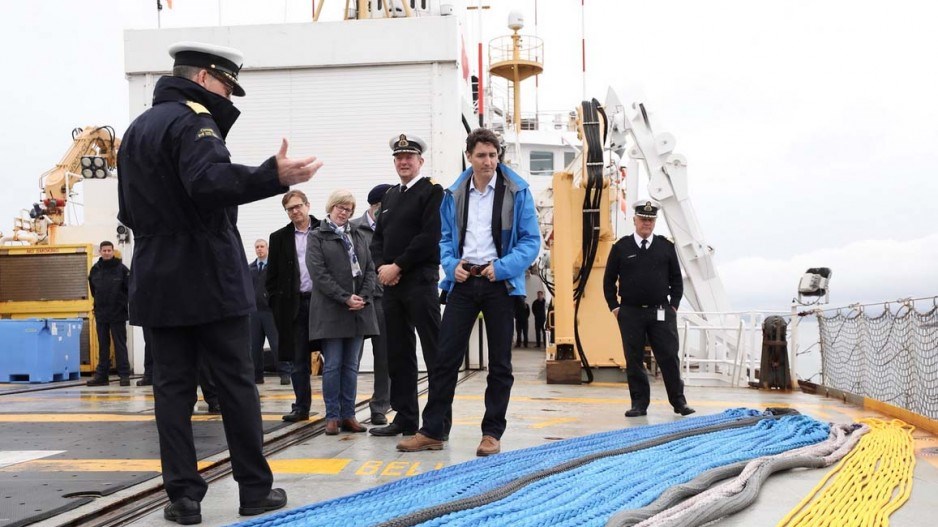With pipelines supplying the fuel, and carbon taxes supplying the spark, Prime Minister Justin Trudeau was in B.C. and Alberta this week trying to prevent a fire.
He was met with jeering anti-pipeline protestors in Vancouver Thursday, April 5, and is in Fort McMurray today touring the oil sands.
And while he walks a tightrope between supporting a fossil fuel industry and trying to implement effective climate change plans, climate change activists on the left and climate change deniers on the right are shaking the rope.
Carbon pricing is emerging as a wedge issue in both Alberta and Ontario, where NDP and Liberal governments could be replaced in upcoming elections with conservative leaders who have vowed to scrap provincial climate change policies and go to war with Ottawa over its national carbon pricing scheme.
Meanwhile, Saskatchewan continues to resist carbon pricing altogether.
Which might explain why the Ecofiscal Commission was busy this week conducting a public awareness blitz aimed at explaining to Canadians why carbon pricing needs the support of industry and ordinary Canadians.
“Carbon pricing does work” was the main message. But its own polling suggests that convincing Canadians of that is going to be tough.
An Abacus Data poll that it commissioned found that the majority of Canadians believe in anthropegenic climate change and the need to address it, but that there is confusion, reticence and cynicism over carbon pricing in Canada.
Part of the problem is the suspicion among some Canadians that carbon taxes are just a tax grab that, at the end of the day, won’t put much of a dent in greenhouse gases (GHG).
The Ecofiscal Commission points to B.C.’s carbon tax and California’s cap-and-trade system to demonstrate that they do work, even though California’s GHG reductions under cap-and-trade have been modest and, following an initial dip, B.C.’s GHG emissions have been rising in recent years, thanks to the carbon tax being frozen at $30 per tonne between 2012 and 2017.
But Ecofiscal Commission research director Dale Beugin said it’s important to note that, both in B.C. and California, GHGs would be much higher than they are now without carbon taxes and cap-and-trade.
The commission estimates B.C.’s GHG emissions would be 5% to 15% higher today had it not implemented a carbon tax in 2008.
As for impacts on the economy, the two jurisdictions in North America that were first out of the gate with aggressive climate change policies and carbon pricing – B.C. and California – have both have outpaced their respective nations in terms of economic growth.
“Canadians want policy that reduces GHG emissions without undermining the economy, and I think that there’s some narratives and some misunderstandings out there that you can’t have both those things – that one comes at the cost of the other,” Beugin said.
“The evidence doesn’t really bear that out. The evidence is pretty clear that it reduces emissions but it doesn’t really undermine a strong economy.”
Provincial governments have until the end of this year to submit their carbon pricing plans to the federal government. In 2019, the federal government will implement carbon pricing, starting at a modest $10 per tonne, rising to $50 per tonne by 2022.
But even at those modest prices, Canadians are balking at the idea of any new tax. And there is polarization among many Canadians when it comes to carbon pricing and oil.
The Abacus Data poll suggests that there is less support among Canadians when carbon pricing is seen as a weapon against the oil industry, and more support when it’s seen as a tool to build a sustainable economy that has both a fossil fuel industry and effective climate change policies.
“While most people (60%) say we should continue to develop these resources while using carbon pricing and other measures to transition to a lower carbon future, 40% feel we must greatly slow or stop development,” the Abacus poll finds.
“What this tells us is that when carbon pricing is employed as a rhetorical argument against Canadian oil it produces polarization. When characterized as an incentive to accelerate transition the opposite occurs.”
In Ontario and Quebec, the Abacus poll found that 80% of Quebec and 70% of Ontario residents don’t even know that they already have carbon pricing. That’s no doubt because both provinces use a cap-and-trade system, which is hard to understand and less visible than carbon taxes.
B.C. and Alberta have economy-wide carbon taxes, and Manitoba also plans to implement a carbon tax that will both start and stay at $25 per tonne.
If B.C. is any measure, Manitoba may find that its carbon tax will result in an initial dip in GHGs, then level off and perhaps even start to rise, because for carbon pricing to work, it needs to gradually but continuously rise.
If carbon pricing alone is the main tool for fighting climate change, it is estimated that it needs to hit $200 per tonne by 2030.
Chris Bataille, a Simon Fraser University energy economist, has argued that a maximum carbon price of $130 per tonne would work, if Canada adopted an interprovincial cap-and-trade system, in which cap-and-trade provinces like Ontario offset emissions in Alberta.
Even among economists and academics who support strong climate change policies, there is disagreement over carbon pricing.
SFU energy economist Mark Jaccard has suggested that carbon pricing as a main tool, though effective, is such a hard sell politically that some provinces should be allowed to use flexible regulations instead – giving credit to Saskatchewan for investing in carbon capture and storage, for example.
The Ecofioscal Commission insists that carbon pricing the most effective and least costly tool. And the longer governments wait to price carbon, the higher the prices have to be.
“The longer we wait, the more it’s going to cost to eventually reduce our emissions,” Beugin said.




